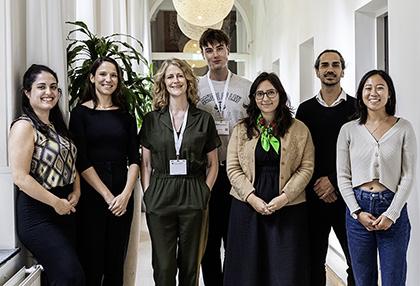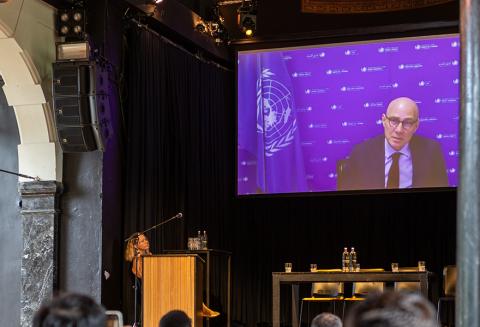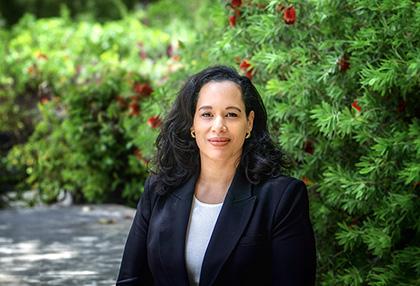
Dozens of the world’s top thought leaders and advocates in international law, human rights, racial justice and ecological crises convened in Amsterdam, the Netherlands, from May 27 to 29, for a conference marking the launch of UCLA School of Law’s the Promise Institute Europe.
“The conversations I had with other activists and scholars about ecocide and indigenous sovereignty were incredibly thought-provoking and inspiring. These connections are ones that I will continue to cherish and will undoubtedly have a lasting impact on my legal career.”

Conference panels included “Conflict, Environmental Harm and International Criminal Law,” “Climate Change, Justice and the Future of the Law of the Sea,” “Environmental Rights and Climate Justice,” and “Evidence, State Responsibility and the Voices of the Most Vulnerable.”
“The conversations I had with other activists and scholars about ecocide and indigenous sovereignty were incredibly thought-provoking and inspiring,” says UCLA Law student Julia Nguyen ’25. “These connections are ones that I will continue to cherish and will undoubtedly have a lasting impact on my legal career.”
In his keynote address, Volker Türk, the United Nations High Commissioner for Human Rights, expressed support for classifying ecocide as a new international crime. In another keynote presentation, Nazhat Shameem Khan, a deputy prosecutor at the International Criminal Court, said, “We know that unchecked environmental degradation poses an existential threat to the world as we know it. The international legal system, including the ICC, stands at a crucial juncture where we must remain relevant and respond to this crisis before it is too late.”
Cheryl Bazard, the ambassador of the Bahamas to Belgium and the European Union, also addressed the topic in a stirring speech. “Devastating storms, rising sea-levels, unpredictable weather patterns and other adverse effects of climate change threaten the very existence of our islands and the livelihoods and identities of our people,” she said. “The obligations of states in respect of climate change are not an abstract legal exercise, but a matter of survival.”
In addition, the Promise Europe hosted a high-level consultation for the ICC prosecutor, Karim Khan, regarding his forthcoming policy paper on environmental crimes. This allowed him and Kevin Jon Heller, a scholar of international law and special advisor to the ICC, to hear from a broad array of viewpoints, including from environmental activists and attorneys on the frontlines of the climate emergency. The conversation stemmed from a project in which Mackintosh had supervised a group of UCLA Law students who analyzed responses to a public call for inputs on this policy.
The Promise Europe came away from the conference rich with projects that participants formulated or made stronger through their collaboration at the event. These include work with, and legal assistance for, youth climate activists across Africa; a collaboration with academic partners on a new evidence resource for climate litigation; and continued support to the ICC prosecutor on environmental crimes.
“At the conference, we worked with practitioners and activists to ask what story we need to tell, whose story we need to tell and how we need to tell it to make the most compelling case for climate and environmental justice,” Mackintosh says. “Crucially, we are foregrounding the voices and analyses of people on the frontlines of the ecological crisis, as without these inputs we will never find comprehensive and lasting solutions. It is time to unlock the potential of international law to confront this crisis and move us towards a new era of multi-species care, kinship and justice.”

UCLA Professor of Law Anna Spain Bradley was appointed by President Joseph R. Biden as one of four U.S.
The focus of global attention in recent years has been China's top-down, state-driven approach to environmental protection and "ecological civilization." What role is there for China's civil society groups these days in mitigating China's environmental impact globally and at home? How do they approach their work? What are the opportunities and risks involved? We are joined by several of China's leading environmental advocates to discuss this important topic.
Lunch will be provided. Please RSVP at https://forms.office.com/pages/responsepage.aspx?id=Dz0K4fyknUeaUMNeP56btaLviW5IGg1JhmNGSSylymJUMVlURlRQVjhERDNLTzFEQTNBRk1NUVNPWS4u.
Join us for a conversation with The Honorable Geraldine Byrne Nason, Ambassador of Ireland to the United States.
Wednesday, March 6, 2024
4:00 PM (Pacific Time)
UCLA School of Law, Room 1314
385 Charles E Young Drive East
Los Angeles, CA 90095

ABOUT THE TALK
Senior Irish diplomat Ambassador Geraldine Byrne Nason will share her experiences and insights on the negotiation and resolution of global conflicts, including during her time on the UN Security Council.
ABOUT THE SPEAKER
Ambassador Geraldine Byrne Nason assumed her role as Ireland’s 19th Ambassador to the United States in August 2022. Geraldine was Ambassador and Permanent Representative of Ireland to the United Nations in New York (2017- 22). Previously, she served as Ambassador to France (2014-17), Second Secretary General in the Department of the Taoiseach (Prime Minister) (2011-14), Ambassador and Ireland’s Deputy Permanent Representative to the EU (2005-11)), and Director of the National Forum on Europe (2004-05).
During her career, Ambassador Byrne Nason has served in Brussels, New York, Paris, Vienna and Helsinki. As Second Secretary-General in the Department of the Taoiseach from 2011-2014, she was the highest ranking female public servant in Ireland. During that period, she also was Secretary General of Ireland’s Economic Management Council.
On her arrival in New York, Ambassador Byrne Nason led Ireland’s successful campaign for a seat on the United Nations Security Council, and led the New York Security Council team for the 2021-2022 term. Geraldine was Chair of the United Nations Commission on the Status of Women (CSW) for 2018 and 2019. She has also co-chaired high-level political negotiations on the hundredth anniversary of the birth of Nelson Mandela and on the ‘Samoa pathway’ for Small Island Developing States.
ABOUT THE MODERATOR
Kal Raustiala holds the Promise Institute Chair in Comparative and International Law at UCLA Law School and is a Professor at the UCLA International Institute, where he teaches in the Program on Global Studies. Since 2007 he has served as Director of the UCLA Burkle Center for International Relations. From 2012-2015 he was UCLA’s Associate Vice Provost for International Studies and Faculty Director of the International Education Office. Professor Raustiala's research focuses on international law, international relations, and intellectual property.
Sponsor(s): Burkle Center for International Relations, Center for European and Russian Studies, International & Comparative Law Program (ICLP) at UCLA School of Law, The Promise Institute for Human Rights at UCLA School of Law